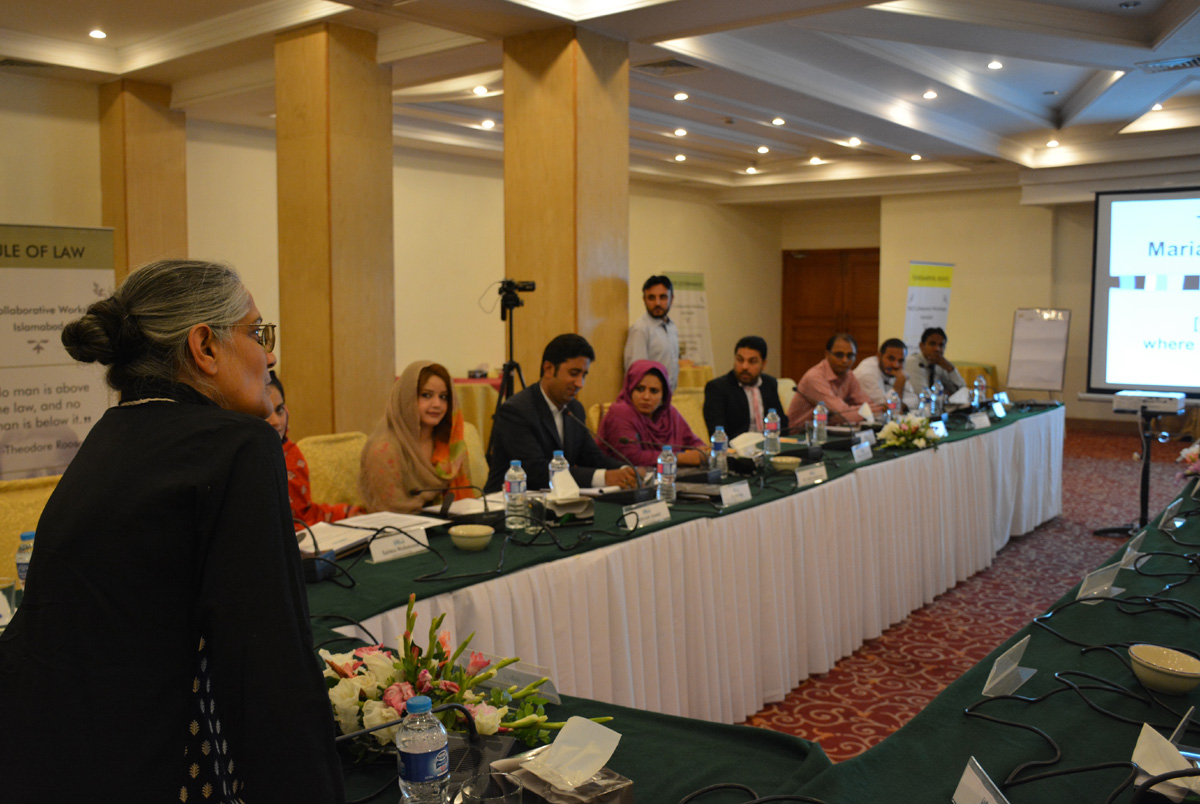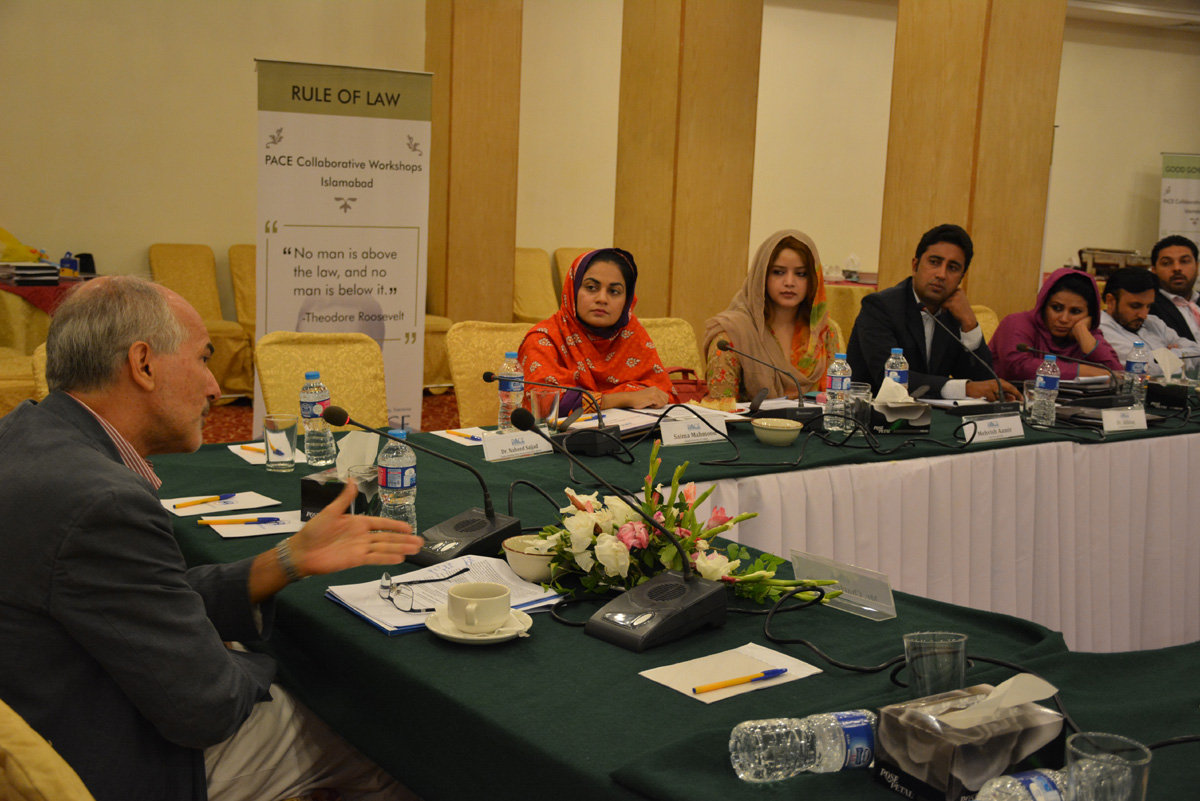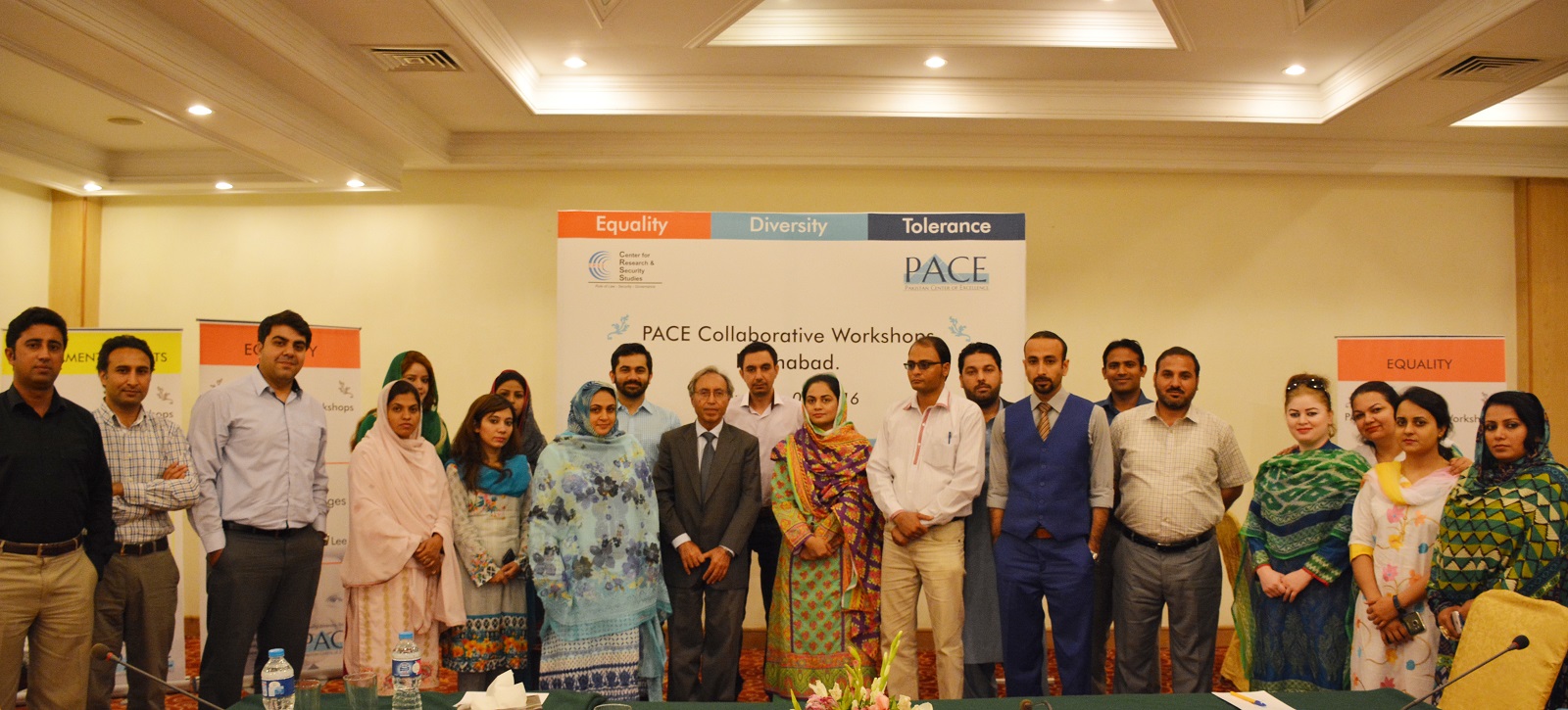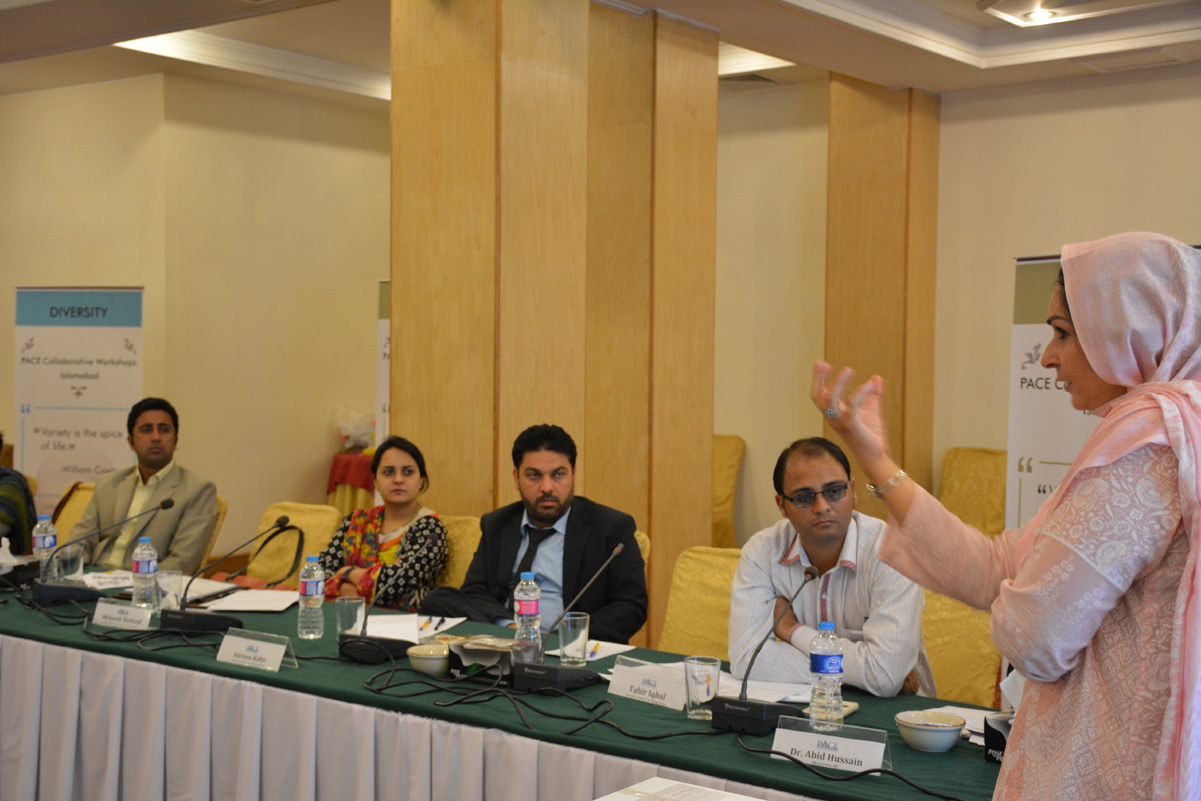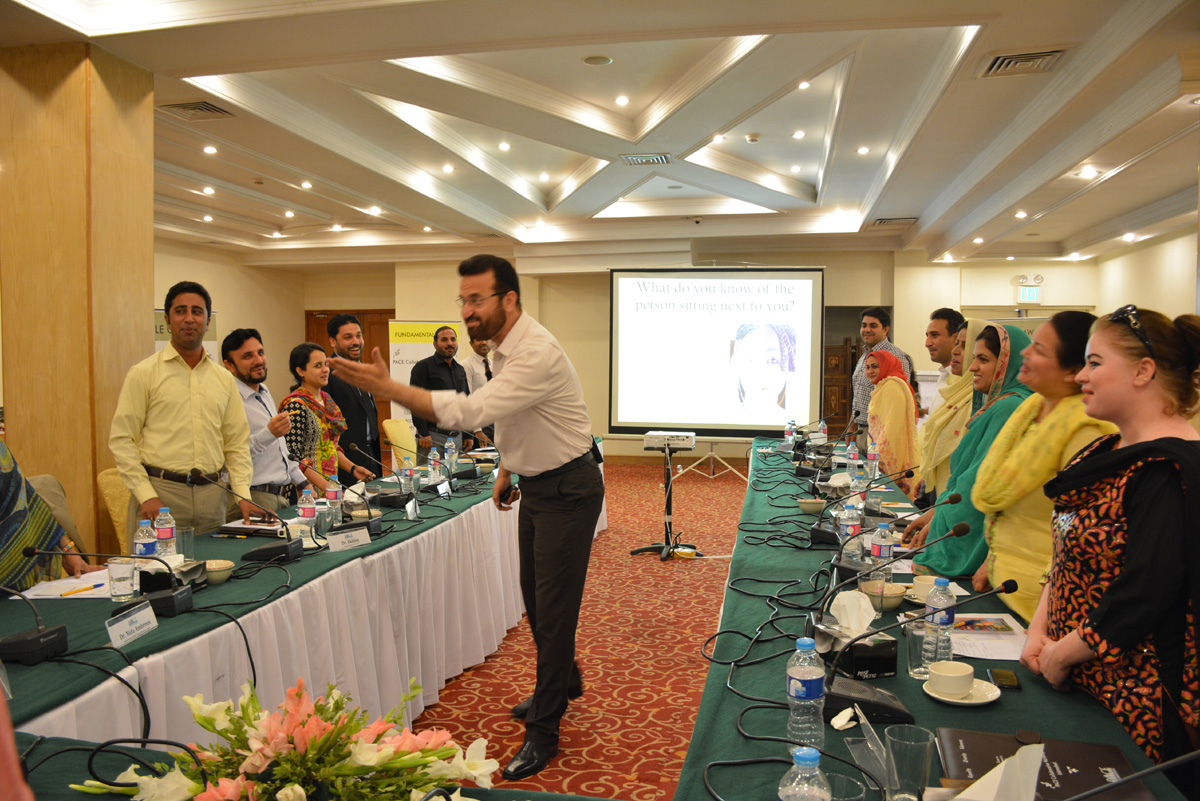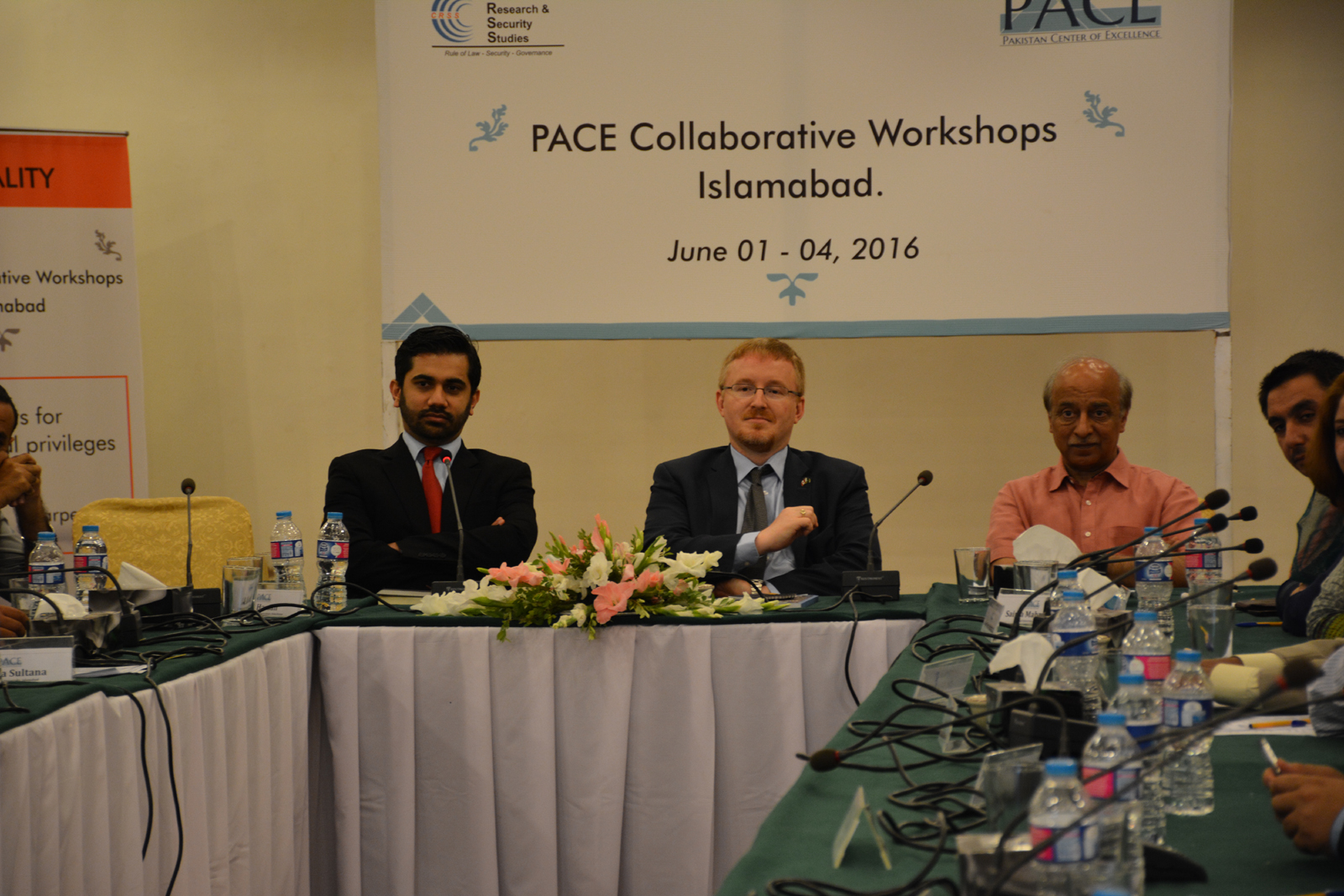The Center for Research and Security Studies (CRSS) conducted the forth four-days collaborative workshop for young university lecturers and professors from June 1st to 4th, 2016 at Hill View Hotel, Islamabad. The workshop was conducted under the umbrella of the Pakistan Center of Excellence (PACE), a counter-radicalization, pluralistic values focused project, in collaboration with the Dutch Government. Participants included young university lecturers and professors from Quaid-e-Azam University (QAU), Sardar Bahadur Khan Women University, Lasbela Agriculture University, CECOS University, University of Science & Technology Bannu, Khushal Khan Khattak University Karak, Balochistan University, Gomal University and Punch University, Azad Jammu and Kashmir.
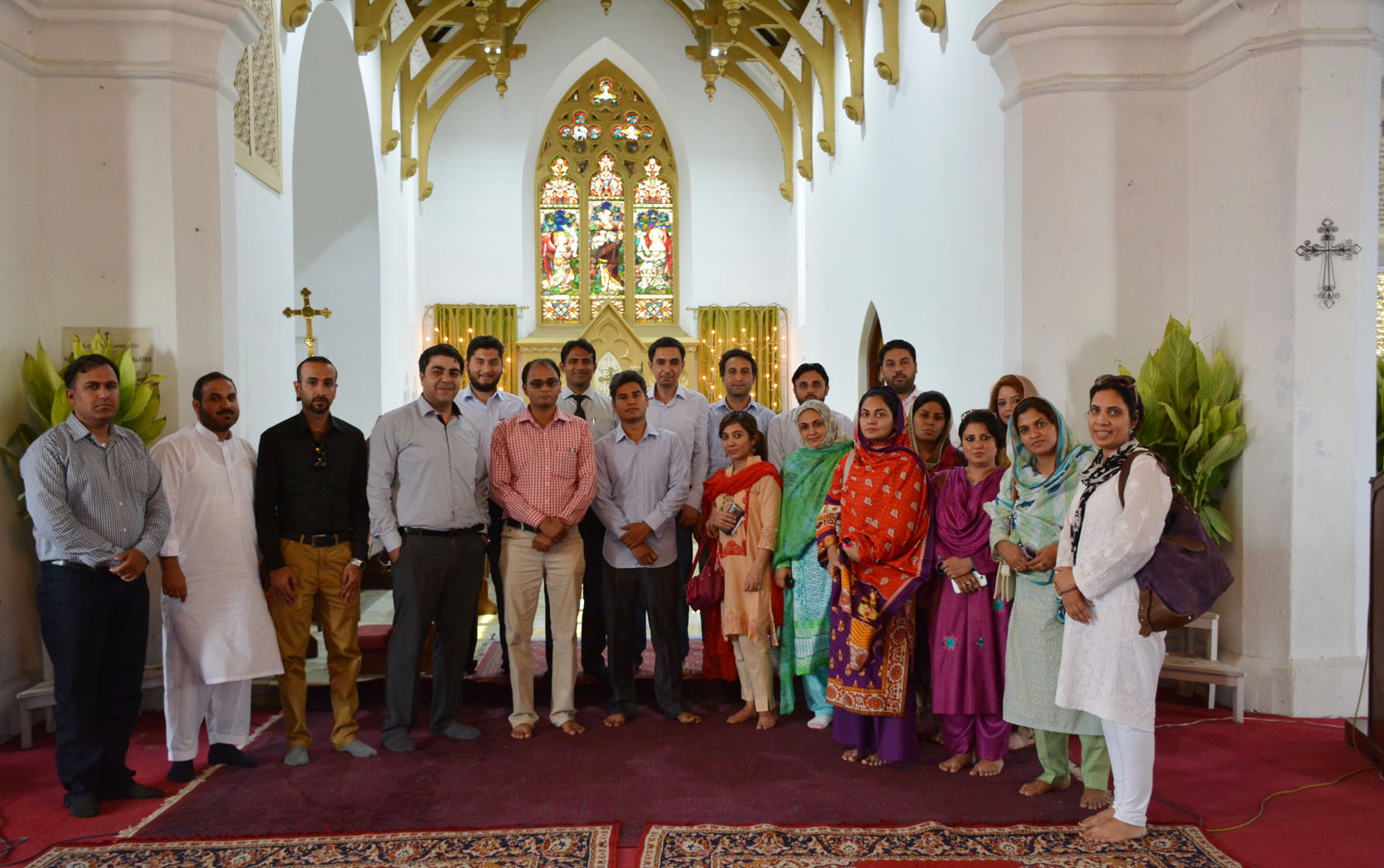
Mr. Zeeshan Salahuddin, Director Communication and Strategy, welcomed participants to the workshop, saying that PACE is put together by CRSS to counter radicalization, inculcate critical thinking, question preconceived notions and narratives, and embed the national discourse in constitutionalism and the rule of law. He said that PACE is grounded in the universal values of tolerance and acceptance. Tolerance is one virtue that leads to a range of other factors such as perseverance, coexistence and the idea of peace building. He elaborated that adherence to rule of law, respect for diversity, opinions and rights, and ideas of perseverance, coexistence, peace building and tolerance can be inculcated in the minds of the youth only by the teachers, the gate keepers of the future.
[read more about Zeeshan Salahuddin]
Workshop Core Areas
The young professionals were trained in following areas:
- Leadership and motivation
- Equal citizenry and respect for rule of law
- Fundamentals of democracy, governance and accountability
- Respect for diversity, opinions and rights
- Rights of minorities and other marginalized groups
- Constitutionalism, and adherence to Pakistan’s Constitution, particularly articles 8-28
- The importance of asking critical questions in the pursuit of knowledge
The cadre of young lecturers was trained by the experts in the above mentioned fields including: Mr. Shiraz Paracha, Ms. Tahira Abdullah, Mr. Charles Pietre, Dr. Rasool Bakhsh Rais, Dr. Qibla Ayaz, Ms. Puruesh Chaudhry, Ms. Humaira Masihhuddin and Mr. Safiullah Gul.
Mr. Shiraz Paracha kicked off his session on the topic of tolerance and democracy. He said that two decades ago, there was no concept of free media. In 1986, in the era of Mohammad Khan Junejo, few efforts were made to abolish self-censorship and a little freedom was awarded to media. In today’s world media is considered to be the fourth pillar of the government and it needs to be sensible and responsible.
He said, “We are not mature in our thoughts and this is apparent in media, in politics, in our academic institutions and in the society overall. No society can develop without critical approach and thinking. We don’t believe in self-analysis . No society can develop without critical approach and thinking. We don’t believe in self-analysis and make criticism for the sake of criticism. First step towards tolerance is rational thinking and to disagree in the most agreeable way.”
[read more about Shiraz Paracha]
Ms. Tahira Abdullah started her session on re-imagining Pakistan by saying that there is a parliamentary system in Pakistan with three major pillars i.e., executive, judiciary, and legislature and media. There is separation of power and basic fundamental rights are ensured in the constitution. Basic rights equally imply to all without any discrimination. None can deprive anyone of their fundamental rights on the basis of religion, cast, gender or ethnic backgrounds.
Minorities in Pakistan need to be protected from violence and persecution and should be treated as equals.
[read more about Tahira Abdullah]
Mr. Charles Petrie spoke on what to expect from the UN and international organizations in Pakistan. He said that he has observed Pakistan for a long time and the one thing that is most interesting is the vibrancy of the people and culture. The people in Pakistan have the potential to think differently and implement it a unique way. Perceptions of the west are fundamentally different because of the misunderstanding on what is happening in the country. Violence is the one thing that denies the people the right to live and leads to destruction. People can be traumatized with violence as part of the world politics. Oppression creates absolute despair.
Differences should push to dialogue, instead of violence and destruction. If in a society, the mechanism of rule of law is not working properly, it can lead to a destructive society. There are two points which are very important for survival i.e., struggle hard and never give up. This is the only thing which can keep people moving on in their lives. He encouraged the audience to always question the narrative they have been given.
[read more about Charles James Petrie]
Dr. Rasool Bakhsh Raees shared his views on respect for diversity, opinion and rights saying that differences among human beings are natural. Factions will emerge because of the reason of being free. Each individual is born free and has right to live his life in their own way.
Multiculturalism is that no society can be homogeneous believing in one set of ideas. Diversity is everywhere. Respect for diversity is coexistence, peace and harmony under a political and institutional framework. Differences are not a challenge and do not impose any limitation on growth of individual or society. Every individual has a right to be different and be respected by all.
[read more about Dr.Rasul Baksh Raees]
Mr. Qibla Ayaz started his session on the topic of democracy, governance and accountability. He shared his views saying that accountability is a prerequisite for democratic systems. When we talk about Pakistan, democracy has always been portrayed as a failed system. We need to ponder whether democracy has really failed or has it just been portrayed as such. Democracy stabilizes with able leadership and this is what we lack in Pakistan. Good governance can emerge only if democracy is mature and stable.
[read more about Dr. Qibla Ayaz]
Ms. Puruesh Chaudhry had a session on respect for diversity, rights and opinions. Through an interactive session, the group agreed on a definition of respect, diversity, rights and opinion and how it is important for the social construct of a society. She said that the Constitution provides equal rights to all the citizens and no one is above the law. Articles 8-28 basically deal with basic human rights, each individual should be respected and treated equal and should not be discriminated on the basis of religion, color, cast and gender.
[read more about Puruesh Chaudhary]
The last day of the workshop kicked off with social activist and advocate Ms. Humaira Masihhudin speaking on the theme of pluralism and multiculturalism. “Human beings belong to one origin and one place,” she said. “Very few societies in the world have been homogeneous, and there is no such society that exists in the modern world. Most societies consist of different ethnic groups. We may define minority as a group of people who are singled out from the other groups and differently treated, because of their physical or cultural characteristics. Minority is a subordinate group as opposed to the dominant group.”
[read more about Humaira Masihuddin]
Mr. Safiullah Gul, bureau chief for a private television channel in Peshawar, conducted a session on leadership and motivation where he emphasized the extent to which effort is directed towards a goal, and its components: activation, persistence and intensity. His session, filled with activities to enhance creative and critical thinking, focused on looking at things from a slightly different perspective to encourage problem-solving.
[read more about Safiullah Gul]
Concluding Ceremony
His Excellency Mr. Andrew Turner, the acting Canadian High Commissioner, said during the closing ceremony, “It is a great pleasure to be here, I congratulate CRSS for organizing this event on such an important series of topics and thank you all for participating.” He added, “Mainstream rejection of exclusionary principles is one way of defeating xenophobia. Xenophobes are individuals who have never been exposed to people from other backgrounds. The doctrine of reasonable accommodation, for instance, allowed Sikhs in Canada to wear their turbans proudly, as long as it does not impede their function or public interest.”
He concluded that Canada could serve as an example to emulate for Pakistan, a country with such rich diversity across a variety of vectors.
CRSS Executive Director Mr. Imtiaz Gul said that Pakistan can learn how Canada has adjusted itself to the huge amount of challenges that had emerged from fallout of 9/11. He added during his 2011 visit, he was impressed by the legal and administrative laws Canadians had adopted in which the government’s paramount guiding principle was public interest. “Pakistan,” he stressed, “needs to do the same.”

